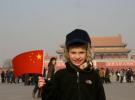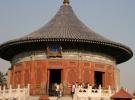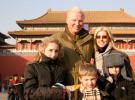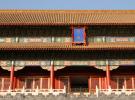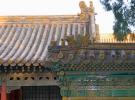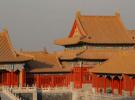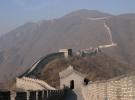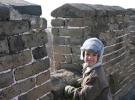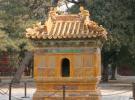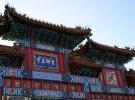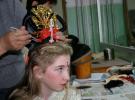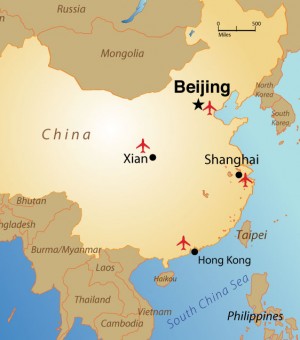Destinations > Asia > China > China
Destination:
China
- Overview
- Basics
- Getting Ready
- Strategies
- Trip Highlights
- Itinerary
- MLS Signature Trip: Women’s Tour of China
- Accommodations
- Beijing
- Xi’an
- Shanghai
- Hong Kong
- Contacts
Basics
topWhen to Go
Spring and fall are generally the best months to travel. November and December are quite good in Southern China and Hong Kong. The peak foreign tourist season is June to September, but try to avoid this period if you don't like the heat.
topWeather & Temperature
As one of the largest countries in the world, China has a diverse climate- from subtropical in the South to subarctic in the North. Early spring and late autumn bring warm, dry days and cool, dry evenings in the North. Temperature and humidity drop from November to February in the South. Sands blown in from the Gobi Desert can yellow the skies in Beijing in March and April.
| Beijing, China | |||||||||||||||||||||||||||||||||||||||||||||||||||||||||||||||||||||||||||||||||||||||||||||||||||
| JAN | FEB | MAR | APR | MAY | JUN | JUL | AUG | SEP | OCT | NOV | DEC | ||||||||||||||||||||||||||||||||||||||||||||||||||||||||||||||||||||||||||||||||||||||||
| Average High Temperature | °F | 35 | 42 | 53 | 68 | 79 | 86 | 88 | 86 | 79 | 66 | 50 | 38 | ||||||||||||||||||||||||||||||||||||||||||||||||||||||||||||||||||||||||||||||||||||||
| °C | 2 | 5 | 12 | 20 | 26 | 30 | 31 | 30 | 26 | 19 | 10 | 4 | |||||||||||||||||||||||||||||||||||||||||||||||||||||||||||||||||||||||||||||||||||||||
| Average Low Temperature | °F | 18 | 24 | 34 | 48 | 58 | 67 | 72 | 70 | 60 | 47 | 33 | 22 | ||||||||||||||||||||||||||||||||||||||||||||||||||||||||||||||||||||||||||||||||||||||
| °C | -8 | -5 | 1 | 9 | 14 | 20 | 22 | 21 | 16 | 8 | 0 | -5 | |||||||||||||||||||||||||||||||||||||||||||||||||||||||||||||||||||||||||||||||||||||||
| Average Precipitation | in | 0.1 | 0.14 | 0.27 | 0.76 | 1.1 | 2 | 5.1 | 3.6 | 1.3 | 0.66 | 0.32 | 0.07 | ||||||||||||||||||||||||||||||||||||||||||||||||||||||||||||||||||||||||||||||||||||||
| cm | 0.25 | 0.36 | 0.69 | 1.9 | 3 | 5.1 | 12.9 | 9.3 | 3.4 | 1.6 | 0.81 | 0.19 | |||||||||||||||||||||||||||||||||||||||||||||||||||||||||||||||||||||||||||||||||||||||
| Shanghai, China | |||||||||||||||||||||||||||||||||||||||||||||||||||||||||||||||||||||||||||||||||||||||||||||||||||
| JAN | FEB | MAR | APR | MAY | JUN | JUL | AUG | SEP | OCT | NOV | DEC | ||||||||||||||||||||||||||||||||||||||||||||||||||||||||||||||||||||||||||||||||||||||||
| Average High Temperature | °F | 46 | 49 | 56 | 67 | 76 | 82 | 89 | 88 | 82 | 72 | 63 | 52 | ||||||||||||||||||||||||||||||||||||||||||||||||||||||||||||||||||||||||||||||||||||||
| °C | 8 | 10 | 13 | 20 | 24 | 28 | 32 | 31 | 28 | 22 | 17 | 11 | |||||||||||||||||||||||||||||||||||||||||||||||||||||||||||||||||||||||||||||||||||||||
| Average Low Temperature | °F | 36 | 39 | 45 | 54 | 63 | 71 | 78 | 78 | 72 | 62 | 52 | 41 | ||||||||||||||||||||||||||||||||||||||||||||||||||||||||||||||||||||||||||||||||||||||
| °C | 2 | 4 | 7 | 12 | 17 | 22 | 26 | 26 | 22 | 17 | 11 | 5 | |||||||||||||||||||||||||||||||||||||||||||||||||||||||||||||||||||||||||||||||||||||||
| Average Precipitation | in | 3 | 1.9 | 3.7 | 2.8 | 3.6 | 7.7 | 4.5 | 8.8 | 2.7 | 2.3 | 1.9 | 1.9 | ||||||||||||||||||||||||||||||||||||||||||||||||||||||||||||||||||||||||||||||||||||||
| cm | 7.7 | 5 | 9.4 | 7.1 | 9.3 | 19.6 | 11.6 | 22.4 | 7 | 5.8 | 4.9 | 4.8 | |||||||||||||||||||||||||||||||||||||||||||||||||||||||||||||||||||||||||||||||||||||||
| Xi'an, China | |||||||||||||||||||||||||||||||||||||||||||||||||||||||||||||||||||||||||||||||||||||||||||||||||||
| JAN | FEB | MAR | APR | MAY | JUN | JUL | AUG | SEP | OCT | NOV | DEC | ||||||||||||||||||||||||||||||||||||||||||||||||||||||||||||||||||||||||||||||||||||||||
| Average High Temperature | °F | 44 | 49 | 57 | 70 | 78 | 85 | 88 | 87 | 80 | 71 | 60 | 48 | ||||||||||||||||||||||||||||||||||||||||||||||||||||||||||||||||||||||||||||||||||||||
| °C | 7 | 9 | 14 | 21 | 26 | 29 | 31 | 30 | 26 | 21 | 15 | 9 | |||||||||||||||||||||||||||||||||||||||||||||||||||||||||||||||||||||||||||||||||||||||
| Average Low Temperature | °F | 30 | 34 | 42 | 54 | 62 | 70 | 75 | 73 | 64 | 54 | 43 | 34 | ||||||||||||||||||||||||||||||||||||||||||||||||||||||||||||||||||||||||||||||||||||||
| °C | -1 | 1 | 6 | 12 | 17 | 21 | 24 | 23 | 18 | 12 | 6 | 1 | |||||||||||||||||||||||||||||||||||||||||||||||||||||||||||||||||||||||||||||||||||||||
| Average Precipitation | in | 0.93 | 1.3 | 2.2 | 2 | 3.5 | 4.4 | 4.5 | 5.1 | 2.2 | 2 | 1.3 | 0.76 | ||||||||||||||||||||||||||||||||||||||||||||||||||||||||||||||||||||||||||||||||||||||
| cm | 2.3 | 3.4 | 5.7 | 5.1 | 8.9 | 11.3 | 11.4 | 13 | 5.6 | 5.1 | 3.4 | 1.9 | |||||||||||||||||||||||||||||||||||||||||||||||||||||||||||||||||||||||||||||||||||||||
| Hong Kong | |||||||||||||||||||||||||||||||||||||||||||||||||||||||||||||||||||||||||||||||||||||||||||||||||||
| JAN | FEB | MAR | APR | MAY | JUN | JUL | AUG | SEP | OCT | NOV | DEC | ||||||||||||||||||||||||||||||||||||||||||||||||||||||||||||||||||||||||||||||||||||||||
| Average High Temperature | °F | 67 | 67 | 72 | 79 | 85 | 88 | 90 | 90 | 88 | 85 | 78 | 71 | ||||||||||||||||||||||||||||||||||||||||||||||||||||||||||||||||||||||||||||||||||||||
| °C | 20 | 20 | 22 | 26 | 29 | 31 | 32 | 32 | 31 | 29 | 25 | 21 | |||||||||||||||||||||||||||||||||||||||||||||||||||||||||||||||||||||||||||||||||||||||
| Average Low Temperature | °F | 55 | 56 | 62 | 69 | 74 | 78 | 79 | 79 | 77 | 72 | 64 | 56 | ||||||||||||||||||||||||||||||||||||||||||||||||||||||||||||||||||||||||||||||||||||||
| °C | 13 | 13 | 16 | 20 | 24 | 26 | 26 | 26 | 25 | 22 | 18 | 14 | |||||||||||||||||||||||||||||||||||||||||||||||||||||||||||||||||||||||||||||||||||||||
| Average Precipitation | in | 0.83 | 1.3 | 1.7 | 4.4 | 6.2 | 9.3 | 9.9 | 11 | 6.5 | 1.6 | 0.86 | 0.84 | ||||||||||||||||||||||||||||||||||||||||||||||||||||||||||||||||||||||||||||||||||||||
| cm | 2 | 3.2 | 4.4 | 11.2 | 15.8 | 23.7 | 25.2 | 28.1 | 16.5 | 4.1 | 2.1 | 2.1 | |||||||||||||||||||||||||||||||||||||||||||||||||||||||||||||||||||||||||||||||||||||||
topTime Difference
All of China, including Hong Kong, occupies only one time zone. Time is set to Beijing, which is eight hours ahead of Greenwich Mean Time (+8GMT) and 13 hours ahead of Eastern Standard Time (+13EST). China does not observe Daylight Savings Time.
topPassport & Visa Requirements
A passport valid for six months and a visa are necessary to enter China. Most Western foreign nationals don't need a visa to enter Hong Kong.
topMoney Matters
Local Currency
The currency is yuan (¥), also known as renminbi (RMB). Notes come in denominations of ¥100, ¥50, ¥20, ¥10, ¥5, ¥2 and ¥1 (also a coin). The word yuan is rarely spoken, and sums are usually referred to as kuai qian, "pieces of money," usually shortened to just kuai. There are also smaller notes of ¥.50, ¥.20, and ¥.10, as well as coins for these values. In Hong Kong, the currency is the Hong Kong dollar (HK$).
ATMs
There are ATMs throughout China, but only a select number of Bank of China machines accept foreign cards. Beijing and Shanghai have additional Citibank, Hong Kong and Shanghai Bank machines that take nearly every card. But always carry enough yuan for your immediate needs, as it may be difficult to access cash outside of these areas. ATMs accepting foreign cards in Hong Kong are widely available.
Traveler's Checks & Credit Cards
Traveler's checks are accepted at select branches of the Bank of China, foreign exchange desks in hotels, larger department stores and the most popular destinations. In Hong Kong, checks are welcome at banks and moneychangers. Credit cards are of limited use in China. Although Visa and MasterCard signs abound, only the Chinese versions of these cards are typically honored. Better hotels accept foreign cards, however, as do most up-market restaurants. Major credit cards are widely accepted in Hong Kong.
Tipping
In Hong Kong, restaurants and bars will automatically add a 10% service charge to your bill, but you're still expected to leave small change for the waiter - up to a few dollars in the nicer restaurants. Taxi drivers will be happy with HK$1 and the standard for porters is HK$10 to HK$20. As a general rule, don't tip throughout the rest of China, though waiters in luxury hotel restaurants may expect a tip in addition to the 15% service charge normally added to your bill in these establishments.
topPhone
Dialing Codes
The country code for Mainland China is 86, for Hong Kong 852. To call China from the US, dial 011 + country code + city code (omit leading zero) + local number. Hong Kong has no city codes, so after the country code, simply dial the local number.
Information & Emergency Numbers
Dial 110 for police, 119 for fire and 120 for an ambulance. But do be aware that international assistance (115) is the only line likely to have English-speaking operators.
Mobile Phones
Coverage is excellent in larger cities, near major tourist destinations, and sporadically throughout the rest of the country. Many cell phones from outside China can be used via roaming agreements with international networks. For details, check with your local service provider.
topElectrical
Electric current is 220v, 50 cycles AC. Most devices from North America cannot be used without a converter. As there is no set plug-in standard, the best option is to purchase a universal travel adapter (such as National Geographic's) prior to departure. A power surge cable will protect laptops against voltage fluctuations, which are common.
topWater
Don't drink the tap water in Mainland China. Use bottled water, even when brushing your teeth. The water is safe in Honk Kong, though you may still prefer the taste of bottled water.
topEtiquette and Customs
Greetings and gestures
The standard handshake is now common, although the Chinese have a tendency to hang on longer. Take business cards if you have them, as an exchange of cards almost always follows. Present yours with two hands, and then hold the one you're given with two hands. To show respect, take a moment to carefully look at the card you are presented.
Avoiding offense
However great the provocation, do not lose your temper and shout at someone in public or cause him or her to experience public shame (loss of face). Even flatly contradicting someone in front of others (so he loses face) is best avoided. Instead, complain calmly, privately and directly to a superior if you wish. Punctuality is very important in China, and traffic congestion in most cities makes that difficult, so allow plenty of time.
Copyright 2013 MyLittleSwans, LLC. All rights reserved. My Little Swans, the logo and Share a world of experience are registered Trademarks of MyLittleSwans, LLC. Use of this site constitutes acceptance of our Terms of Use and Privacy Policy.


